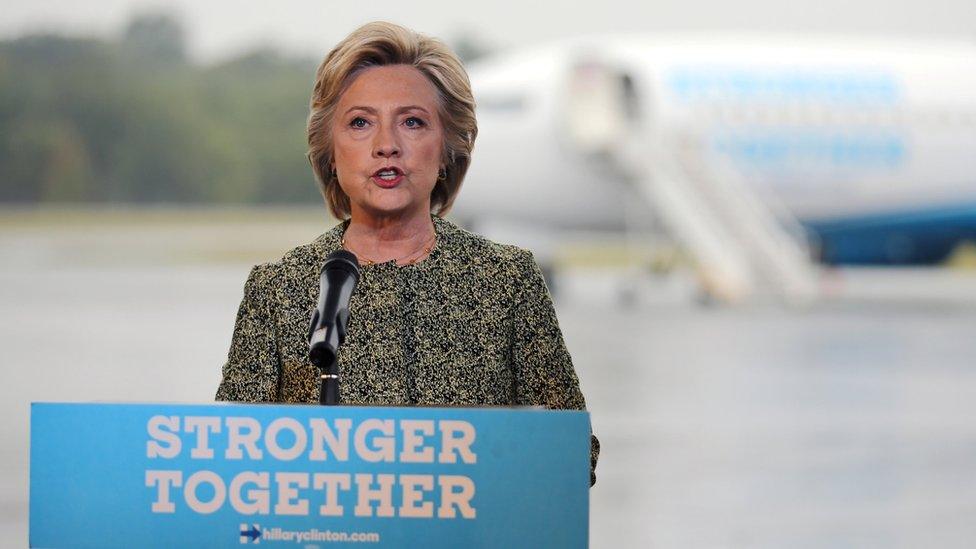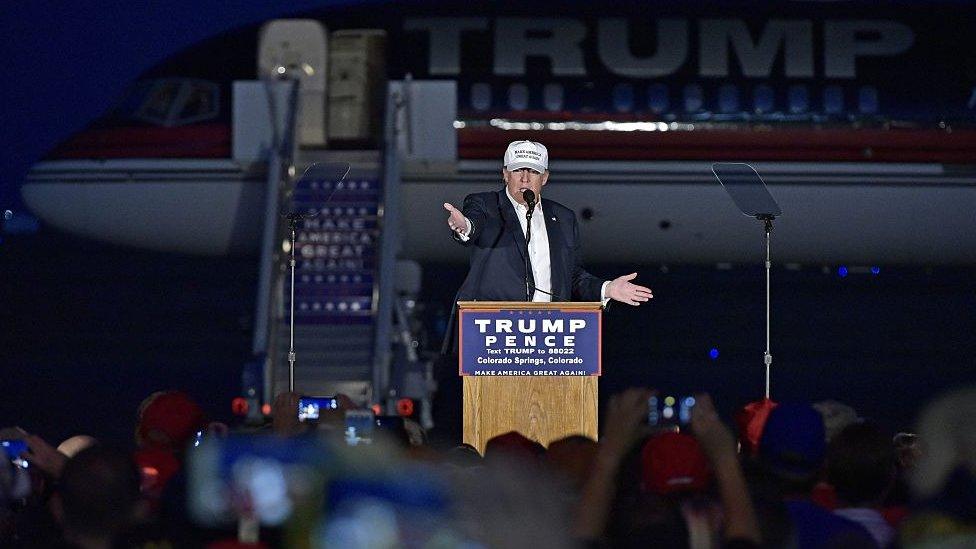New York bombing: Could blasts affect race for White House?
- Published

Donald Trump showed a bit of restraint, at least for a while. Hillary Clinton amped up her rhetoric and seemed to acknowledge that the Republican nominee isn't her only opponent.
In the immediate aftermath of the New York City bombings, both campaigns scrambled to gain the upper hand and revealed a bit about their strategies heading into the final months of the election.
For Mr Trump, at first it appeared his Chelsea response would be another shoot-from-the-hip affair. Shortly after word spread of the explosion in New York City - before officials confirmed the nature of the incident - he told a rally in Colorado that a bomb had gone off.
"It's a terrible thing what's going on in our world, what's going on in our country, but we are going to get tough and smart and vigilant, and we are going to end it," he said.
Then an interesting thing happened. For the next 24 hours, the Republican nominee - who is quick to share his opinion on pretty much everything - went quiet.
Aside from a tweet, external offering condolences and best wishes to the "families and victims" of the bombing, Mr Trump pulled a disappearing act.
That was a marked contrast to his reaction to the Orlando shooting in June and could reflect an acknowledgement on the part of the Republican's campaign that discretion in the face of a national crisis is a wise strategy.
After Orlando, Mr Trump sent out a tweet, external saying he appreciated the "congratulations" for "being right on radical Islamic terrorism".

Donald Trump went dark on Twitter for hours after the New York bombings
He followed that up with a call for President Barack Obama to resign and a fiery speech blaming the shooting on US immigration policy.
There was some thought that a national security crisis might help Mr Trump in the general election, given that the Paris shootings in December boosted his Republican primary poll numbers. Surveys after Orlando, however, showed this was not the case.
A Washington Post poll, external in late June gave Mrs Clinton a 50% to 39% edge in handling terrorism - an 8% improvement from May. When asked which candidate reacted better to the shooting, 46% said Mrs Clinton, while only 28% opted for Mr Trump.
As the Post noted, it was one of the few times in the past 12 years where a Democrat scored better on "handling terrorism" than the Republican opponent.
Mr Trump has steadily chipped away at Mrs Clinton's lead in the polls over the past few weeks after the Democrat surged ahead following the national conventions in late July. Now Mr Trump has another opportunity to prove his mettle as commander-in-chief.
If the Trump campaign has decided that a measured response is the best strategy, the real question will be whether the candidate can stick to it. On Sunday night, he was back on Twitter, launching a flurry, external of attacks, external against Mr Obama and Mrs Clinton.
On Monday morning he boasted during a telephone interview that he accurately described the explosions in New York City as a bombing before anyone else.
"I should be a newscaster because I called it before the news," Mr Trump said. "What I said was exactly correct."
He also said his plan as president was to "knock the hell" out of the so-called Islamic State, stop being "gentle" and have law enforcement engage in profiling to prevent militant attacks.
It seems the old Trump had returned - at least for now.
Footage from WABC shows the suspect being loaded into an ambulance
Meanwhile, in a hastily scheduled press conference on Monday morning, Mrs Clinton shed some of her earlier discretion and took direct shots at Mr Trump, saying that his "irresponsible, reckless rhetoric" was being used by the so-called Islamic State to recruit new fighters.
"We also know from the former head of our counterterrorism centre, Matt Olsen, that the kinds of rhetoric and language that Mr Trump has used is giving aid and comfort to our adversaries," she said.
That line prompted a swift response, external from Trump communications advisor, Jason Miller, who said the Democrat was accusing her opponent of treason.
"If Clinton really wants to find the real cause of ISIS, she needs to take a long, hard look in the mirror," he said. "The decision to remove all American troops from Iraq in 2011, which was vigorously supported by Clinton, created the vacuum that led to the founding of ISIS."
Miller then pounced on the news that the Obama Administration had accidentally granted citizenship to some immigrants from countries that present national security concerns.
"It is highly disturbing and entirely unacceptable that 858 immigrants from dangerous countries have slipped into our country and been granted full US citizenship because of the failed policies supported by President Obama and Hillary Clinton," he wrote in a separate a statement, external.
Mrs Clinton's remarks may have also revealed a bit about how she views the current dynamics of the race. Twice she noted that she is the "only candidate in the race" who has made life-and-death decisions on engaging enemy combatants on the battlefield.
"I have sat at that table in the [White House] Situation Room," she said. "I've analysed the threats. I've contributed to actions that have neutralised our enemies. I know how to do this."
With those lines Mrs Clinton not only attempted to differentiate herself from Mr Trump, but also from third-party candidates like Libertarian Gary Johnson and Green Party candidate Jill Stein.
US presidential candidate: 'What is Aleppo?'
Recent polls show those two candidates cutting into, external Mrs Clinton's lead, particularly among young voters. Perhaps this is the beginning of an effort by the Democrat to use the national security issue as a way to prevent Americans from casting ballots for these lesser-known candidates.
If that's the case, Mr Johnson isn't helping his cause. Two weeks ago he struggled to understand a question about the refugee crisis in the Syrian city of Aleppo. And in a television interview on Monday, the Libertarian nominee was asked, external what he would do to improve law enforcement's ability to prevent terrorist attacks in the US.
"It's really a collaborative effort, and as president of the United States, you know, you're going to be the arbiter-in-chief over all of this," he said. "And it's why I'm seeking the job. I just found it to be incredibly challenging, interesting, and interesting from the standpoint of always trying to make things better. I mean that's as humankind, as citizens of this country."
That should clear things up.
Both Mrs Clinton and Mr Trump are vying to lay claim to the national security issue in this race. They may justifiably view it as the key to winning the White House, given heightened public anxiety following these most recent attacks.
The election may hinge on whether the American public decides it is too risky to change current tactics and go with an outsider like Mr Trump - or too risky not to.
- Published12 September 2016
- Published8 September 2016
- Published7 September 2016